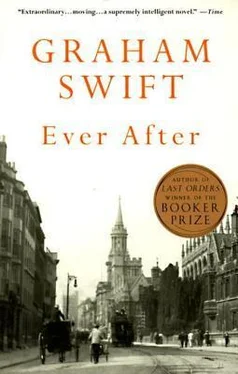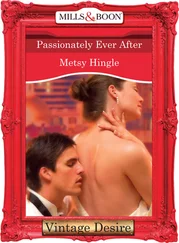I see Elizabeth turn from the dressing-table, put down her hairbrush. I don’t believe that these Victorians were really, when it came to it, so Victorian. So demure and strait-laced. I don’t believe they were a different species, who propagated their kind by some method less intimate and passionate than ours. John, Christopher, Felix, Lucy. The atmosphere at Leigh House in those early days was surely ripe with love; as sticky, as fertile, as any pullulating little patch of ground that Matthew would have stooped over with his magnifying glass and collecting bottle, ready to trace yet more evidence of nature’s astonishing irrepressibility.
For that was how the villagers of Burlford must now and then have come across him, on Jacob’s Hill or in Loxley Wood, though not yet with the haunted and furtive looks he would later display when discovered in this way. Far from it. Like as not, he would wave to you and give you the time of day and tell you something savouring rather of one of Rector Hunt’s harvest-tide sermons, about how all creatures were exquisitely adapted to their purpose in creation. Which was obliging of him.
To be sure, he had his scientifical fancies, did the Rector’s new son-in-law — beetle-hunting and the like. But he was a good sort, for all his being a Cornishman larded over with Oxford learning. He made a fine picture with his young wife at church on a Sunday and said his Amen as loud as anyone, and any man who could marry the Rector’s favourite daughter with the Rector’s own blessing was good enough for Burlford and should hold himself, what’s more, a privileged mortal. He didn’t put on airs or hide the twang in his voice. All in all, he seemed to have his head set square on his shoulders and his feet square on the ground, and everything as it should be in between, judging by results. More to the point, when he stopped jawing about bugs and caterpillars, he could lean against a gate with you and tell you all that was worth knowing about the field in front of you, just by looking. Which showed he had a care for those who lived by the land and wasn’t just a lackey to the folk in Tavistock who got rich quick (and poor again just as quick, no doubt) by burrowing about underneath it.…
Happiness quells thought. And work quells thought. And Matthew did not lack for work. I see him, as his neighbours saw him, riding off over the hill to a world that was changing even more rapidly than his father-in-law’s misgivings could encompass.
Who has heard of the copper rush of southwest Devon (you see, Potter, I have done my homework), which came and went over a century ago? Forget your Klondikes and your Californias. Who has heard of Josiah Hitchens of Tavistock, “King of Copper,” who in 1844, the same year that Matthew Pearce encountered an ichthyosaur and also happened upon Elizabeth Hunt, discovered in a wood in the Tamar valley a copper lode so rich that it would form the basis for almost two decades of the biggest copper mine in Europe and within two years return its shareholders eight hundred per cent. The “mine”—that is, a chain, a family of mines (Hitchens must have regarded them as his children), which multiplied themselves along the course of the lode: Wheal Maria, Wheal Fanny, Wheal Anna-Maria, Wheal Josiah (naturally), Wheal Emma … Collectively known as Devon Great Consols.
Then there were all the lesser, hopeful ventures spawned by Hitchens’ discovery — including the Wheal Talbot mine, in which a certain James Neale would have a dominant interest. Then all the attendant enterprises (all work for Matthew): quays on the lower Tamar (ore out; coal in), canals, pumping systems, even the Consols’ own railway.
Under the guidance of his moribund senior partner, Matthew would have acquired the sought-after skills of a mining surveyor and watched the sinking of shaft after shaft. Beneath the day-to-day bustle of it all, the uncanny irony must surely have struck him. That he should be plunged, so literally, so nakedly, into the realms of Geology. That he should be lowered — for sometimes it must have been required of him — into those subterranean zones from which no one returns without having their view of life on the surface modified. When he rode back over the hill to Burlford and took in the timeless cluster of rooftops and church tower, the rookeried beeches behind the Rectory, how did it seem? Like a welcome refuge? (After all, he and Elizabeth might have chosen to live in Tavistock itself.) Or, more and more, like some piece of brittle, nostalgic scenery?
24th June 1856:
I perceive the Rector apprehends the literal undermining of his parochial security. Tavistock marches outwards — underground! Says: “My dear Matthew, I fear there will soon be nothing left of our familiar surroundings but a precarious crust. When you ride into Tavistock, do you not expect at every moment your swift descent into the lower world?” Answer, to the point: “I assure you, sir, we surface dwellers are in no such danger.” Do not say: “But the picture we cherish of our familiar world may be a thin crust for all that.”
And then there was the railway. By 1849 it had reached Plymouth, with further track laid in Cornwall. A little matter, in between, of spanning the Tamar estuary at Saltash: it would take ten years. Matthew worked on the Ivybridge-to-Plymouth section and on the projected Tavistock branch line, and, as early as 1848, would have been involved in the preliminary surveys and geological soundings for Brunel’s great Saltash bridge. It was during this time that Matthew himself was first introduced to Brunel (these little glimpses of the great — you can see why Potter is keen) and came under the spell of the engineer’s mixture of practical genius and formidable energy.
18th August 1854:
… I have grasped the meaning of I.K.B.’s perpetual cigars: he must have them, as furnaces must have chimneys — they are lit from within .
(So Brunel was a smoker too.)
And it was during this time which marked the high tide of Victorian endeavour and the high tide of Matthew and Elizabeth’s marriage that the couple, like true devotees of the new age, travelled to London (by express train, naturally) to see the Great Exhibition.
11th September 1855:
I remember — but four years ago — how we journeyed up to see the Exhibition. I do not think there could have been two happier people. It was her first journey of any length by train, and she was full of the astonishment of the thing — how it could not be possible that the cattle and the hedgerows and barns and millponds passed by so quickly and smoothly, as if they moved, not us; and how London, which she had never seen, was surely too far a place to be reached so rapidly. And I was full of how it was all, indeed, quite possible, giving a reprise — she acknowledged it — of my observations on that day we first met, and expounding the further mysteries of gradients and viaducts and cuttings and tunnels, until she threw up her hands and said, “Stop it, stop it, please! I would rather admire than know!” Whereupon I said, continuing to tease, “I grant you the joys of ignorant wonder, but, to quote your father — that is, to quote one of his quotations: ‘Felix qui potuit rerum cognoscere causas’ ” (giving a fair imitation of the Rector’s best scholastical style). Whereupon we laughed like children out of school, apologising, in his absence, to the good man.
Then she said suddenly, “Why — that is it! We should call him Felix!”—for she was then newly with child for the third time. “Is not that a happy name?!” “So it is another boy?” I said. “Of course,” she said. “And how can you tell?” “I simply can. Was I wrong with John and Christopher? You see, my dear Matty, in this case I know and you must admire.”
Читать дальше












